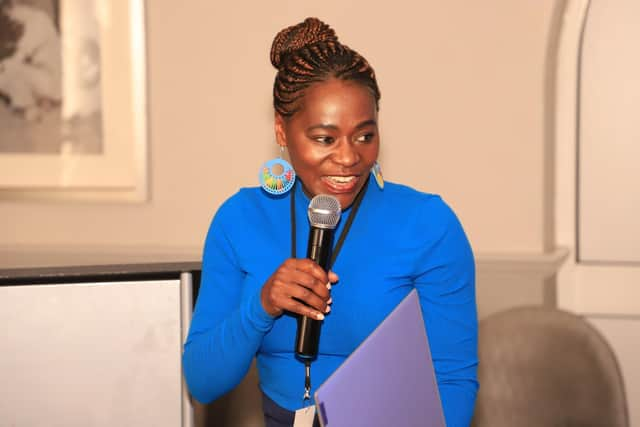Banbury teens expert offers parents and schools help for youngsters suffering loneliness and mental health issues


Angela Karanja, a mum who lives in Sussex Drive, offers free masterclasses for parents and teachers but she also goes out into the community to spread the message that teenage mental health problems are manageable.
Ms Karanja works with teenagers and younger children. She explains that the problems associated with adolescence can begin as early as eight-years-old and go on until 25. Some unresolved issues become lifelong bars to a happy and successful life, but this can be changed, she says.
Advertisement
Hide AdAdvertisement
Hide Ad"Mental health issues in teens are widespread. Most schools don't have the facilities or time to help as much as necessary - and a lot don't have the knowledge,” she said.


"Even if you’ve never had mental health problems in the family, fear and anxiety can come from modern life. The issues can be real or imaginary but they feel true and can cause symptoms in the young person - because the brain’s ‘fight or flight’ instinct doesn't distinguish between real and the imagination.
"The ‘flight’ response to fear is natural in humans; it has evolved for our self-preservation. But in today’s world we don’t face lions or tigers to make us take flight. What we suffer is a constant battering of real or imagined threats that cause the same intense anxiety. It can be anything from family breakdown to bullying, fear of climate change, abuse, failure, self-image and many other things.
"Our bodies were not meant to withstand such continuous reaction and it can make life miserable. Kids may not want to go to school, they may have headaches, tummy aches, psychosomatic illness/symptoms, aggression, bad behaviour – it can come out in many ways.”
Advertisement
Hide AdAdvertisement
Hide AdMs Karanja helps parents to identify interventions that work. “It’s about processing and reframing thoughts that have become habitual,” she said.
"I've worked with youngsters in the community and in schools and the reason I like to work with parents is that I may only have an hour with the young person but if parents have the strategies, they can work with their children.
"These reframing techniques have to be practiced - we're dealing with retraining the mind; changing the conditioned habit. It's not a one-day job.“Teachers can incorporate things in their lessons to make pupils feel settled, because the brain needs to be settled to be receptive. The teaching and lesson plans are not the problem but it's the ability of the child to absorb the learning which is not easy if the mind is distracted by emotional issues.
"Things happen in life and it is important to know how we process them so we become victors instead of remaining in victimhood. I had a terrible childhood and I share my experiences and explain how the young mind processes memories which keep rehearsing the trauma again and again.”
Advertisement
Hide AdAdvertisement
Hide AdMs Karanja’s work with children and parents stresses the importance of good connection between the two rather than ‘correction’ of what may be seen as rebelliousness or defiance.
Children naturally want to be independent but to achieve that, they need good connection with the parents at home to give them confidence to make the right decisions.
"In adolescent years especially they show us how they don’t need us but it's the time they need us most. That's the mental age when they feel most lonely because a lot of things are changing and they have the darkest times when they're alone. Emotional loneliness makes young people very susceptible.
“The youngster is moving away from being a child to another stage. Everyone sees them as a grown up and they are expected to do more, be more responsible and have more skills - but they don't have the mental skills. The ‘executive function’ of the brain has not developed at that age and it's why parents are in the perfect position to help.”
Advertisement
Hide AdAdvertisement
Hide AdMs Karanja offers parents strategies which involve a lot of positive affirmation, reassurance and reward to which their children will be receptive and respond with less resistance.
“We think teenagers want to be connected with everyone but their parents, but research shows that parents still remain one of the most protective factors in their lives and my techniques aim to help create and retain trust and honesty between parent and child – moving away from parenting to partnering, to supporting them to live their best life; not directing it but helping them choose.
“Children need connection - they need to be heard, seen and valued and if we can do that for them we allow them to feel worthy. If children haven't got that psychological wellness and self worth – feeling understood - there is a lot we can do to make them feel valued,” she said.
Ms Karanja’s website offers her parents of teens masterclass which gives strategies to self-regulate and to mentor and motivate their young people. There is also a free webinar for schools and colleges to help teachers promote the mental wellbeing of students to develop resilience.
Advertisement
Hide AdAdvertisement
Hide AdShe is very happy to attend assemblies and classrooms to talk about her work. Her teachers’ masterclass speaks about the need for awareness of childhood experiences, how children can be helped to process events and the real or imagined fear trapped in their bodies to free them for making the most of their education.
To contact Ms Karanja email [email protected] or call (via WhatsApp only) on 07385 915862.
There is a lot of further information and useful links on Ms Karanja’s blog here.